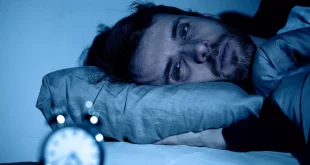Beyond just being tired, insomnia, a common sleep disorder marked by trouble sleeping or staying asleep, has far-reaching consequences. The complex relationship between insomnia and mental health is among the most important—yet often disregarded—aspects of the condition. sleeplessness can be brought on by mental health diseases, but persistent sleeplessness can also bring on or worsen mental health problems. This interaction is reciprocal. Comprehending this interaction is essential for comprehensive health administration and efficacious therapeutic approaches.
The Dangerous Cycle of Mental Health and Insomnia
There is a complicated and varied relationship between insomnia and mental health. This relationship is supported by a number of physiological and psychological processes, which combine to form a vicious cycle that can be difficult to escape.
Mechanisms of Psychology
Psychologically speaking, stress, worry, and sadness are frequently the causes of insomnia. The body’s stress response system can be triggered by stressful life events or persistent stress, which can release hormones like cortisol that throw off the body’s regular sleep-wake cycle. Excessive worry and hyperarousal are two characteristics of anxiety that make it difficult for people to unwind and go asleep. Contrarily, depression can cause early morning awakenings and a diminished desire to sleep, which can result in disrupted sleep patterns.
Physiological Processes
Insomnia physiologically alters the neurotransmitter systems of the brain, which are essential for mood control. Lack of sleep throws off the balance of neurotransmitters like dopamine and serotonin, which are essential for preserving emotional stability. Mood swings, irritation, and an increased risk of mental health disorders might result from this disruption. Chronic insomnia is also linked to altered brain chemistry and structure, as well as elevated inflammation, all of which can aggravate pre-existing mental health issues.
The Effects of Sleep Deprivation on Particular Mental Health Conditions
Disorders of Anxiety
Anxiety problems and insomnia are related in both directions. Hyperarousal is a condition in which a person with generalized anxiety disorder (GAD) is excessively aware, making it difficult for them to fall asleep and stay asleep. On the other hand, persistent sleeplessness may raise the chance of anxiety problems. The cycle of anxiety and sleeplessness can be prolonged by a persistent concern about getting enough sleep and the effects of not getting enough sleep.
Depression
Insomnia is a sign and a predictor of depression, and the two conditions are closely related. Research indicates that persons who suffer from insomnia have a ten-fold increased risk of developing depression in comparison to those who do not experience sleep issues. Sleep patterns can be disturbed by depressive feelings including melancholy, hopelessness, and lack of motivation, therefore the relationship is reciprocal. Not only that, but depression-related cognitive distortions like rumination can make it hard to get to sleep or stay asleep.
PTSD, or post-traumatic stress disorder
Sleeplessness is a common and upsetting symptom for those with PTSD. Hyperarousal and nightmares are two factors that lead to sleep problems, and getting too little restorative sleep might make recovery more difficult. A feedback loop that hinders emotional healing and raises the possibility of developing further mental health problems can be created when insomnia aggravates PTSD symptoms.
Taking Care of Insomnia to Enhance Mental Wellness
Treating sleep problems is an essential part of mental health treatment because of the significant negative effects of sleeplessness on mental health. It is possible to interrupt the cycle of mental health disorders and insomnia by utilizing a variety of treatment approaches.
Insomnia Treatment with Cognitive Behavioral Therapy (CBT-I)
The goal of cognitive behavioral therapy for insomnia (CBT-I), an extremely successful evidence-based treatment, is to alter the beliefs and actions that lead to sleep disturbances. In order to support sound sleep patterns, it incorporates methods like cognitive restructuring, sensory control, and sleep limitation. In addition to reducing insomnia, cognitive behavioral therapy (CBT-I) also lessens anxiety and depressive symptoms.
Changes in Lifestyle
Managing insomnia and its effects on mental health can also be greatly aided by making lifestyle changes that improve sleep hygiene. Creating a comfortable sleeping environment and sticking to a regular sleep routine are other crucial measures in enhancing the quality of your sleep.
Modifications in Lifestyle
- Create a Sleep Schedule
Keeping the body’s internal clock in check requires adhering to a regular sleep pattern. Even on weekends, maintaining a regular bedtime and wake-up time can aid with better sleep. Establishing a nightly schedule that include calming pursuits like reading, practicing meditation, or having a warm bath can also help the body recognize when it is time to unwind.
2. Establish a Sleep-Friendly Space
The quality of one’s sleep is greatly influenced by their sleeping environment. Make that the bedroom is cold, quiet, and dark. Purchasing cozy pillows and mattresses might also have a significant impact. Eliminating electronic gadgets from the bedroom, including tablets and smartphones, might lessen exposure to blue light and distractions that might disrupt the generation of melatonin.
3. Employ relaxation and mindfulness practices
Anxiety and stress are frequent causes of sleeplessness. Deep breathing, progressive muscular relaxation, and meditation are examples of mindfulness and relaxation practices that can help quiet the mind and get the body ready for sleep. Frequent application of these methods can enhance emotional health and general stress reduction as well.
4. Restrict Alcohol and Stimulants
When taken too close to bedtime, stimulants like caffeine and nicotine can cause sleep disturbances. In the late afternoon and evening, it is advisable to stay away from these substances. Alcohol can cause fragmented sleep and disturb sleep patterns, even though it may initially make you feel sleepy. Reducing alcohol consumption might enhance the quality of your sleep, especially before bed.
In summary
There is no denying the intricate and undisputed link between sleeplessness and mental health. Many mental health conditions can have insomnia as a symptom or as a cause, which can create a vicious cycle that impairs general wellbeing. It is essential to comprehend and take care of this reciprocal interaction in order to provide successful therapy and enhance quality of life. People can end the cycle of sleeplessness and improve their mental health by combining cognitive-behavioral therapy, medication, and lifestyle changes. Sleep is an essential component of mental health, and this relationship is becoming more and more evident as research reveals its subtleties.






